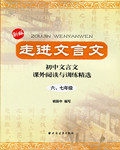题目内容
Your sentence is ________ if you haven’t left out “an”. Next time pay more attention.
| A.perfect | B.specific | C.particular | D.slight |
A
解析

练习册系列答案
 走进文言文系列答案
走进文言文系列答案
相关题目
题目内容
Your sentence is ________ if you haven’t left out “an”. Next time pay more attention.
| A.perfect | B.specific | C.particular | D.slight |
A
解析

 走进文言文系列答案
走进文言文系列答案